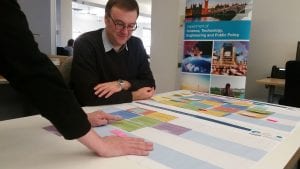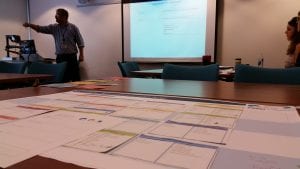Effective Curriculum Design Planning: Arena, Blended, Connected.
By Alan Y Seatwo, on 17 February 2017
Planning is a vital part of the curriculum design process. In 1984, David A. Kolb published his experiential learning theory, which stated that the importance of learning enabled taking the new understanding and translating it into predictions as to what would happen next or what actions should be taken to refine or revise the way a task was to be handled. Providing advice for the planning of curriculum design is an integral part of the role of a learning technologist. It is also one of the most rewarding experiences because it involves working closely with subject matter experts. During planning meetings, discussions on modes of learning, structure and the use of learning technologies are at full flow. Last week, I worked with the Department of Science, Technology, Engineering and Public Policy (STEaPP)’s Head of Department, Dr Jason Blackstock, and Senior Teaching Fellow, David Wright, on digital content development for the department’s 2-week challenge for undergraduates, How to Change the World (HtCtW).
At the start of the term, some staff in the department attended the ABC Curriculum Design Workshop delivered by Digital Education Team. We decided to use it as a framework for our planning of HtCtW. The two-week intensive programme uses a problem-based learning approach. It requires students to understand a complex global challenge and enables students to demonstrate a variety of their competencies (problem solving, creativity, communication and collaboration) to approach the issue. As part of our planning session, the programme leads laid out a series of learning activities on a chart and put them into different categories: knowledge acquisition, discussion, collaboration, practice and production. The simplicity of the model visually demonstrated the concentration on each type of activity through colour coding and highlighted misalignments in the learning cycle. We could easily see the types of learning content and technologies that will be required at the start, during and end of the programme. This finished plan is also a useful communication tool to explain the structure of the programme, learning objectives, assessment and feedback. The plan will be presented to the next meeting of cohort leads of HtCtW from across the Engineering faculty.
Feedback from the staff on the usefulness of this model has been very positive. Although they were aware of the model, this is the first time they have used it to structure a programme. Everyone found it very easy to understand and apply. I have no doubt that this curriculum design model will be used again in the department and I look forward to learning more from using it by other colleagues.
 Close
Close





